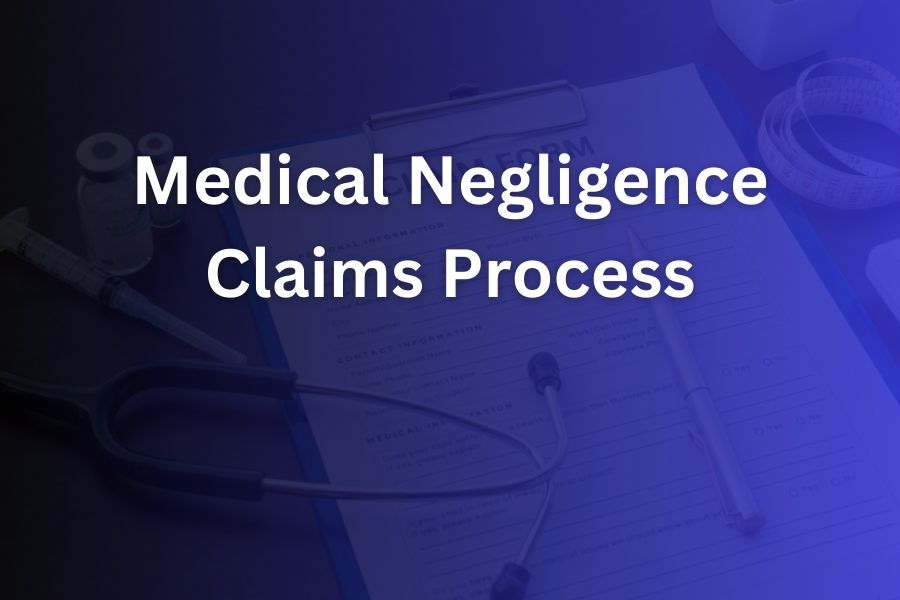
When you face harm because a medical professional did not meet the standard of care, you may feel confused, frustrated, and unsure about what to do next. The medical negligence claims process helps you pursue compensation for the physical, emotional, and financial damage you suffered.
You need clear steps, practical guidance, and confidence as you move forward. This introduction gives you an easy path to understand each stage of the process in a simple and supportive way. You will learn what evidence matters most, how claims unfold, how compensation works, and how to protect your rights in this article.
Understanding Medical Negligence
You deal with medical negligence when a healthcare provider fails to deliver care that aligns with accepted medical standards. This failure leads to injuries or worsened conditions. You hold the legal right to seek compensation when this happens, because every patient deserves safe and competent medical treatment.
You take action against medical negligence when your provider’s mistake directly results in harm. This could involve errors in diagnosis, treatment, aftercare, surgery, medication, or monitoring. You must prove that the provider’s actions were below the standard expected in the medical field.
Common Situations That Lead to Claims
You may start a medical negligence claim after facing issues that include:
- Misdiagnosis or delayed diagnosis
• Surgical mistakes
• Medication errors
• Birth injury complications
• Failure to follow proper safety procedures
• Negligent anesthesia management
• Inadequate post-surgery monitoring
You experience serious consequences in many of these situations. You may face increased medical bills, missed work, long-term complications, or emotional trauma.
First Step, Determining If You Have a Valid Claim
You begin the process by assessing whether your situation meets the legal requirements for negligence. You must show three things. First, the healthcare provider owed you a duty of care. Second, they breached that duty. Third, you suffered measurable harm because of the breach.
You should consider your symptoms, timeline, and how your condition changed after the negligent act. You need strong evidence to support your claim from the earliest stages.
Gathering Evidence for Your Claim
You build your case on clear evidence. Because medical negligence cases involve complex details, you should gather as much documentation as possible.
You may include the following:
- Medical records
• Hospital test results
• Diagnosis reports
• Treatment summaries
• Prescription histories
• Bills and receipts
• Photographs of injuries
• Statements from witnesses or family members
You strengthen your claim by documenting everything that happened before, during, and after the negligence incident. You also keep notes about symptoms, pain levels, and how the injury affects your daily life. Recent data shows that cases with organized documentation resolve faster and result in higher settlement values, because insurance assessors rely heavily on written medical proof.
Speaking With a Medical Negligence Attorney
You improve your chances of success when you meet with an experienced attorney. You discuss your injuries, your medical records, and what you believe happened. The attorney listens, reviews the details, and tells you whether the evidence supports a claim.
You benefit from this step because medical negligence cases require deep medical knowledge, legal strategy, and expert witness coordination. You also gain clarity about deadlines, paperwork, compensation ranges, and the strength of your case.
Understanding Deadlines for Filing
You must follow strict filing deadlines for medical negligence claims. In most states, you file within two or three years from the date of injury. Some states allow more time when you do not immediately realize the injury happened. This is called the discovery rule.
You must act quickly because missing a deadline ends your right to seek compensation. You also give your attorney more time to build a strong case when you begin early.
The Role of Medical Experts in Your Case
You rely on medical experts to explain what went wrong and how the provider failed to meet the standard of care. Experts review your records, write reports, and sometimes testify. You need their support because medical issues require professional interpretation.
You benefit because an expert makes your case stronger. They help prove that the negligence caused your injury. Without expert testimony, medical negligence claims become difficult to win.
Filing the Claim Against the Provider or Facility
You officially start your case when your attorney files a claim or complaint against the responsible healthcare provider or hospital. You outline your injuries, the mistakes that happened, and the compensation you seek.
You must provide accurate details. Even small errors slow the process. After filing, the provider’s legal team and insurance company become involved, and the case moves forward.
Investigation and Evidence Review
You enter a detailed investigation period where both sides review documents, medical records, and witness statements. You may answer written questions, give a recorded statement, or provide more details about your condition.
You take part in this step because the investigation helps clarify the facts. The provider may try to argue that your injury was unavoidable or unrelated. Strong documentation and expert reports protect your claim.
Negotiation and Settlement Discussions
You usually receive a settlement offer before going to court. Many medical negligence cases end with negotiated settlements. Insurance companies prefer this because trials take time and involve risk.
You should not accept the first offer in most cases. Early offers tend to be low. You review the damages, your medical costs, and your long-term needs. With your attorney, you negotiate for a fair amount that reflects the true impact of your injury.
Recent reports show that more than seventy percent of medical negligence claims settle before trial because negotiation benefits both sides. You avoid the stress of court while securing compensation.
When Your Case Goes to Trial
You go to trial only when both sides cannot agree on a settlement. During the trial, each side presents evidence, medical experts, and arguments. A judge or jury then decides the outcome.
You should prepare for trial emotionally and mentally. Trials take time and can feel overwhelming, but a strong legal team guides you through every step. If you win, you receive compensation ordered by the court.
Damages You Can Recover in a Medical Negligence Claim
You may receive compensation for different types of damages depending on your injury. These may include:
- Medical bills
• Future medical treatments
• Lost income
• Reduced earning ability
• Pain and suffering
• Emotional distress
• Long-term disability or impairment
• Loss of enjoyment of life
You calculate damages based on evidence and projections. Claims involving severe long-term complications result in higher compensation because your future care needs may be significant.
How Long the Entire Process Takes
You can expect the medical negligence claims process to take months or years depending on complexity. Minor injuries settle faster. Serious or disputed cases take longer because of extensive investigation and expert involvement.
You should remain patient. Thorough cases lead to stronger compensation outcomes. Rushing harms your results because incomplete evidence weakens your position.
How to Protect Your Rights During the Process
You need to take several protective steps. Keep every document connected to your treatment. Avoid discussing your case publicly. Attend all medical appointments. Follow your doctor’s directions. Inform your attorney of any changes in your condition.
You strengthen your claim by staying consistent and organized. You also reduce the chance of losing important evidence.
When Claims Get Denied and What You Do Next
You may face a denial when an insurance company claims there is not enough evidence or argues that negligence did not occur. A denial does not end your options.
You can appeal the decision or pursue litigation. Your attorney can respond with more evidence, expert reports, or medical analysis to challenge the denial.
Why Many People Delay Filing and Why You Should Not
You may hesitate because you feel unsure, embarrassed, or scared of confronting a doctor or hospital. Some people think the process is too difficult or expensive.
You should not delay because evidence becomes harder to collect as time passes. Witnesses forget details. Records get misplaced. Your legal rights expire under state deadlines. Taking early action benefits you.
Recognizing Red Flags After Medical Treatment
You may notice symptoms immediately or weeks later. You should pay attention to warning signs such as:
- Unusual pain
• Worsening symptoms
• Unexpected complications
• Changes in mobility or function
• Emotional distress
• New conditions following treatment
You protect yourself by seeking a second medical opinion when something feels wrong.
The Emotional Side of Medical Negligence Claims
You may feel overwhelmed, anxious, or angry. These emotions are normal when dealing with medical harm. You also may struggle with trust issues toward healthcare providers.
You should take care of your emotional health. Support groups, therapy, and communication with family members help you manage stress throughout the claims process.
Understanding the Value of Your Claim
You may want to know early how much your case is worth. Claim value depends on injury severity, long-term impact, and financial losses. Cases involving permanent disability or major complications usually result in higher compensation.
You gain a clearer understanding when your medical experts and attorney evaluate your condition, treatment costs, and future needs.
Final Thoughts on Navigating the Claims Process
You gain control and clarity when you understand each stage of the medical negligence claims process. You protect your rights by acting early, gathering strong evidence, and working with experts who support your case.
You deserve fair compensation when negligence causes harm. With the right steps, you move forward confidently and secure the help you need for your recovery.
FAQ’s
What qualifies as medical negligence?
You deal with medical negligence when a healthcare provider fails to meet accepted medical standards and you suffer harm as a result.
How long do I have to file a claim?
You usually have two or three years from the injury date, depending on your state.
Do I need medical records to file a claim?
Yes, you need your records as core evidence to prove what happened and how the negligence harmed you.
Will my case require expert witnesses?
Yes, most medical negligence claims rely on expert testimony to establish the standard of care and show how the provider failed to meet it.
How long does a medical negligence claim take?
You may need months or years depending on the complexity of your injury and the amount of evidence.
Can I settle without going to court?
Yes, most cases settle before trial through negotiation with insurance companies.
What compensation can I recover?
You may receive compensation for medical bills, lost income, pain, suffering, and long-term care needs.
